Bioelectricity
Bioelectricity refers to the electrical impulses that are generated within living organisms, including humans, animals, and plants. These electrical signals play a crucial role in various physiological processes, such as nerve transmission, muscle contraction, and communication within the body.
Key Concepts
- Cell Membrane: The cell membrane is a semi-permeable barrier that separates the interior of a cell from its external environment. It plays a critical role in generating and transmitting bioelectric signals.
- Ions: Ions are electrically charged particles that are essential for the generation of bioelectricity. Common ions involved in bioelectric processes include sodium (Na+), potassium (K+), calcium (Ca2+), and chloride (Cl-).
- Membrane Potential: The membrane potential refers to the difference in electrical charge between the interior and exterior of a cell. This potential difference is essential for the transmission of electrical signals.
- Ion Channels: Ion channels are specialized proteins embedded in the cell membrane that allow the passage of specific ions, thus contributing to the generation and regulation of bioelectric signals.
- Action Potentials: Action potentials are rapid changes in the membrane potential of a cell, particularly in nerve and muscle cells. They play a key role in transmitting electrical impulses along nerve fibers and initiating muscle contractions.
Significance of Bioelectricity
Bioelectricity is fundamental to various physiological processes in living organisms. Some key functions and phenomena associated with bioelectricity include:
- Nerve Signal Transmission
- Muscle Contraction
- Cardiac Rhythms
- Brain Activity and Cognitive Functions
- Regeneration and Wound Healing in Some Animals
Studying Bioelectricity
To understand bioelectricity, it is important to explore the following topics in depth:
- Cell Membrane Structure and Function
- Ion Transport and Ion Channels
- Membrane Potential and Action Potentials
- Neuroelectricity and Nerve Signal Transmission
- Muscle Contraction and Bioelectricity
- Applications of Bioelectricity in Medical Science
Study Tips
Here are some effective study tips for mastering the concept of bioelectricity:
- Visualize the processes involved in bioelectricity using diagrams and interactive resources.
- Review the functions of specific ion channels and their roles in bioelectric signaling.
- Explore real-life examples of bioelectric phenomena in different organisms.
- Engage in hands-on experiments or simulations to observe bioelectric processes firsthand.
- Stay updated on current research and advancements in the field of bioelectricity.
◂Science Worksheets and Study Guides Fourth Grade. Light and Sound
Study Guide Light and sound
Light and sound  Worksheet/Answer key
Worksheet/Answer key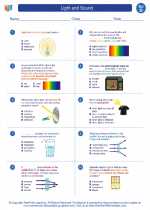 Light and sound
Light and sound  Worksheet/Answer key
Worksheet/Answer key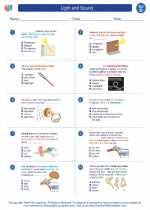 Light and sound
Light and sound  Worksheet/Answer key
Worksheet/Answer key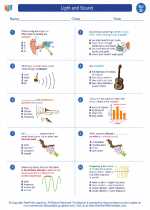 Light and sound
Light and sound  Vocabulary/Answer key
Vocabulary/Answer key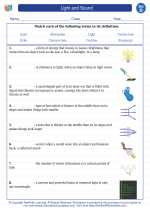 Light and sound
Light and sound  Vocabulary/Answer key
Vocabulary/Answer key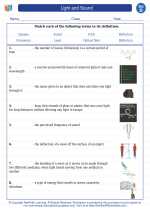 Light and sound
Light and sound  Vocabulary/Answer key
Vocabulary/Answer key Light and sound
Light and sound 

 Worksheet/Answer key
Worksheet/Answer key
 Worksheet/Answer key
Worksheet/Answer key
 Worksheet/Answer key
Worksheet/Answer key
 Vocabulary/Answer key
Vocabulary/Answer key
 Vocabulary/Answer key
Vocabulary/Answer key
 Vocabulary/Answer key
Vocabulary/Answer key

The resources above cover the following skills:
PHYSICAL SCIENCE (NGSS)
Waves and their Applications in Technologies for Information Transfer
Students who demonstrate understanding can:
Develop a model of waves to describe patterns in terms of amplitude and wavelength and that waves can cause objects to move.